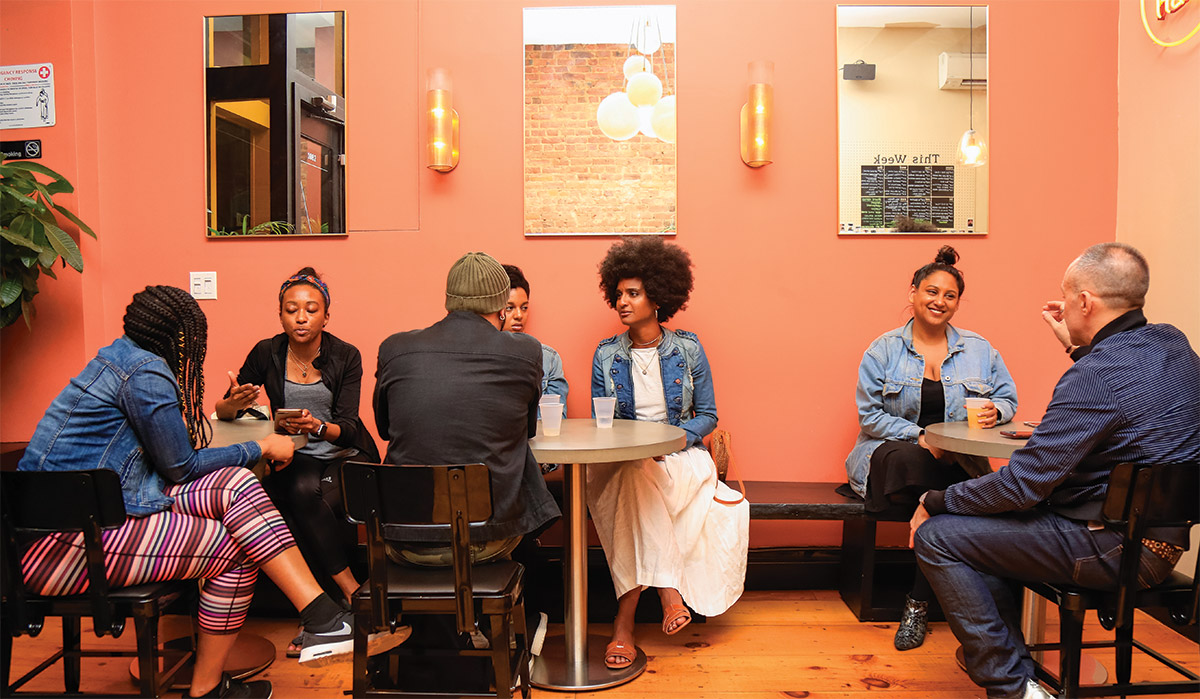
or generations, men who’ve needed help with their mental health have been viewed as failures — too soft, too complicated, unable to cope with “real life.” All the more so for minorities, struggling to gain a foothold in American society.
“In our community, there’s a lot of stigma around going to a therapist,” says Darian Hall (BS Business Administration ’03), who is African American. “Even talking about that was seen as weak. We had to put on this mask of being strong all the time, but that’s not real. We’re not strong all the time, and it’s OK to express that.”
This awareness is part of what drove Hall and business partner Elisa Shankle to found HealHaus, a wellness center, café, and community gathering place in the Bedford–Stuyvesant neighborhood of Brooklyn, New York. Hall calls it a “one-stop shop for all things wellness and self-care for mind, body, and spirit.”
HealHaus offers everything from yoga and meditation to psychotherapy and beyond. Its mission is to make these treatments and activities accessible to people who traditionally haven’t tapped into such resources by making it not just convenient but also comfortable and acceptable — or, as Hall puts it: “Essentially, we’re making it cool.
“Most therapy offices feel clinical, like you must have something wrong with you to go there,” he says. “Our environment is warm and welcoming — there’s a café, there’s good music.” And perhaps most importantly for men in general and people of color, visitors to HealHaus see practitioners and participants who look like them, so they can see and feel that they belong.

or generations, men who’ve needed help with their mental health have been viewed as failures — too soft, too complicated, unable to cope with “real life.” All the more so for minorities, struggling to gain a foothold in American society.
“In our community, there’s a lot of stigma around going to a therapist,” says Darian Hall (BS Business Administration ’03), who is African American. “Even talking about that was seen as weak. We had to put on this mask of being strong all the time, but that’s not real. We’re not strong all the time, and it’s OK to express that.”
This awareness is part of what drove Hall and business partner Elisa Shankle to found HealHaus, a wellness center, café, and community gathering place in the Bedford–Stuyvesant neighborhood of Brooklyn, New York. Hall calls it a “one-stop shop for all things wellness and self-care for mind, body, and spirit.”
HealHaus offers everything from yoga and meditation to psychotherapy and beyond. Its mission is to make these treatments and activities accessible to people who traditionally haven’t tapped into such resources by making it not just convenient but also comfortable and acceptable — or, as Hall puts it: “Essentially, we’re making it cool.
“Most therapy offices feel clinical, like you must have something wrong with you to go there,” he says. “Our environment is warm and welcoming — there’s a café, there’s good music.” And perhaps most importantly for men in general and people of color, visitors to HealHaus see practitioners and participants who look like them, so they can see and feel that they belong.
Before he began investigating his concept, Hall hadn’t been a patron of yoga or meditation studios, and he said he didn’t see many men or people of color when he visited local studios during his research, either. So he asked himself, “How do I get a guy like me to feel welcome and to stay long enough to understand what’s here for him?”
Balancing innovation with expectation
As an innovative brand, HealHaus must strike a balance between the new and necessary and what its audience is already acquainted with. “We’re taking what’s more familiar to people — like the café, or yoga —and building on that,” says Hall. “It’s almost like spoon-feeding people: We start you on a smoothie, and then we educate you on CBD, tinctures we offer, meditation. It shouldn’t be this thing, but it speaks to how lacking this is in our society.”
As a black man, Hall believes that he’s ideally positioned to identify, understand, and address this gap in the marketplace. “I have the lens to see people are being left out. I don’t want anyone to feel excluded, because I know what it feels like. It’s natural for me to ask, ‘How do I make it more comfortable?’ — not just for black people but for anyone who has been left out of this conversation.”

After 18 months, business is booming at HealHaus: The 14 on-site therapists are almost entirely booked up, and the company will be adding more. Hall and Shankle are looking to open a Los Angeles location, to launch a fully digital platform, and to offer corporate wellness programs both at the office and at corporate events.
It’s a lot to take in, and Hall is doing his best not to look too far ahead. “I’m trying to be as present as I can and not get overwhelmed about the potential,” he says.
It helps that since founding HealHaus, Hall has taken advantage of the meditation classes and receives an occasional massage. But he says he was always in it to do something ambitious.
“Coming from a corporate job in medical sales, I was making good money, life was good,” he says. “For me to leave that, to cash out my 401(k), it has to be big, or why do it?”
While he helps others find some measure of peace and relaxation, Hall is driven by his sense of purpose. “I’m seeing people opening up and, wow! It’s a special thing. I didn’t realize the magnitude of the need, and I feel a certain responsibility to go as hard as possible because I know people need what we’re doing.”